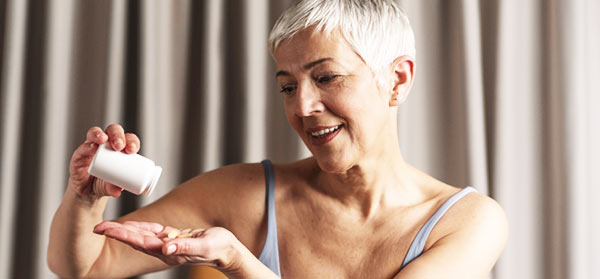Thirty per cent of adult Australians have a vitamin D deficiency, according to Osteoporosis Australia, placing them at risk of bone and joint pain and a heightened risk of falls and bone fractures.
As a result, more than 40 per cent of Australian adults, the majority of them women and the elderly, regularly take supplements, feeding a multibillion-dollar industry.
However, a review published in the Medical Journal of Australia this week has found there is insufficient evidence to support taking these supplements in any form, and that they may actually increase the risk of “adverse health outcomes”.
“The major trials in community-dwelling individuals have not demonstrated fracture prevention with either calcium, vitamin D or their combination,” said the authors, Professor Ian Reid and Associate Professor Mark Bolland, from the University of Auckland.
“Calcium supplements in healthy individuals are not needed, nor are they required in most people receiving treatment for osteoporosis.”
The authors warned that calcium supplements could cause constipation, bloating and kidney stones, and could increase the risk of myocardial infarction.
They said we should focus on obtaining these nutrients naturally.
“Why calcium supplements act differently to calcium-rich foods is not really known,” said practising dietitian Dr Joanna McMillan. “But it is likely that the food matrix and delivery of the calcium may be key.”
Calcium is essential for healthy bones, muscles and organs. It’s found in dairy foods, salmon and sardines, broccoli, bok choy, silverbeet, cucumber, celery, chickpeas, almonds, dried figs and apricots.
Vitamin D also helps to build and maintain strong bones and assists with calcium absorption. It is made in the skin through exposure to the sun, although this mechanism is compromised in many older Australians. It is also found in fatty fish, such as tuna, mackerel and salmon, and in liver, cheese and egg yolks.
“Their [calcium and vitamin D supplements] use as adjunctive therapy in osteoporosis has been the convention, but … there is little evidence that this alters outcomes,” said Prof. Reid and Assoc. Prof. Bolland.
But for otherwise healthy adults, they said such supplements were a waste of money and that we’re better off focusing on food, sunlight and exercise.
“Supplements have value in overtly deficient individuals, but not across the healthy older population. Based on the consistency of the data, we believe that a recommendation not to provide supplements routinely to healthy older individuals can be judged to be evidence-based … and no longer a matter of controversy,” they wrote.
“In summary, small doses of vitamin D have a place in the prevention of osteomalacia in individuals with specific risk factors. Calcium supplements have very little place in contemporary medical practice.”
The Royal Australian College of GPs (RACGP) says that while calcium and vitamin D supplements have been widely used in an attempt to prevent bone loss and prevent fractures in postmenopausal women and older men, evidence indicates that the absolute benefit is low “and considerably less than that seen with licensed osteoporosis treatments”.
It says: “The target calcium intake from dietary sources and supplements should be 1000mg per day for adults, rising to 1300mg per day for women older than 50 years of age and men older than 70 years of age.
“Vitamin D from sunlight exposure (avoiding periods of high ultraviolet-radiation intensity such as in the middle of the day) and supplements should ensure 25-hydroxyvitamin D (25-OH D) levels >50 nmol/L. If vitamin D supplements are required, a dose of 800–1000 IU per day is usually sufficient, although higher doses are needed in some people to achieve target levels. Dietary calcium intake is often suboptimal in the elderly, especially institutionalised individuals.”
Have you been regularly taking vitamin D and calcium supplements? Will you now check with your doctor as to whether you should still take these products?
If you enjoy our content, don’t keep it to yourself. Share our free eNews with your friends and encourage them to sign up.
Related articles:
The ‘poison’ we all eat
Aged blamed for price pain
Text message could save your life
Disclaimer: This article contains general information about health issues and is not advice. For health advice, consult your medical practitioner.

